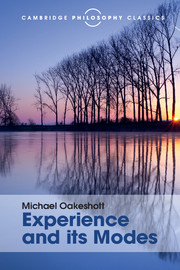Summary
An interest in philosophy is often first aroused by an irrelevant impulse to see the world and ourselves better than we find them. We seek in philosophy what wiser men would look for in a gospel, some guidance as to le prix des choses, some convincing proof that there is nothing degrading in one's being alive, something to make the mystery of human existence less incomprehensible. Thinking is at first associated with an extraneous desire for action. And it is some time, perhaps, before we discern that philosophy is without any direct bearing upon the practical conduct of life, and that it has certainly never offered its true followers anything which could be mistaken for a gospel. Of course, some so-called philosophers afford pretext enough for this particular misunderstanding. Nearly always a philosopher hides a secret ambition, foreign to philosophy, and often it is that of the preacher. But we must learn not to follow the philosophers upon these holiday excursions.
Nor is this the only error to be avoifded. The impulse of mere curiosity is no less foreign to philosophy. When we are consumed with a greed for information, philosophy appears as universal knowledge. Nothing, it seems, should be alien to the philosopher, who must hate ignorance more than he loves discrimination. But this indiscriminate pursuit of universal knowledge is scarcely better than a romantic obsession. And it is foreign to the character of philosophy, because when we are intent upon what is a whole and complete we must resign what is merely encyclopaedic. The savant as such is not a philosopher; there is little or nothing in common between the philosopher and the philosophe. It is only in the childhood of thought, when knowledge appears undifferentiated and each fresh piece of information seems significant just because it is fresh, that universal knowledge can appear to satisfy the philosophic passion. At all events, in these days when we are more conscious of the futility of knowledge than its blessing, it is not to be expected that an encyclopaedia will attract him who is looking for a philosophy.
- Type
- Chapter
- Information
- Experience and its Modes , pp. 1 - 6Publisher: Cambridge University PressPrint publication year: 2015

